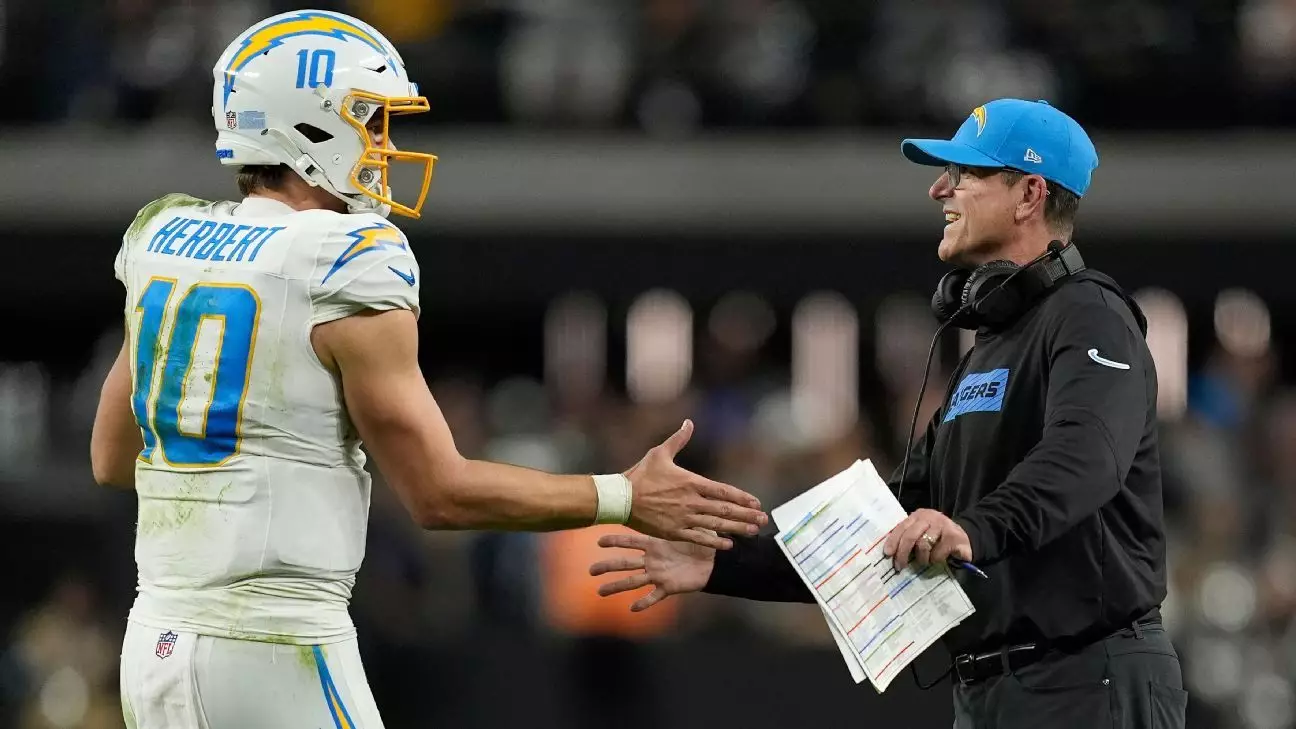In recent NFL history, few quarterbacks have captured the imagination of fans and analysts quite like Justin Herbert of the Los Angeles Chargers. Despite his undeniable talent and record-setting performances during the regular season, the postseason has presented challenges for Herbert that have led to intense scrutiny and debate. In a pivotal playoff game against the Houston Texans, Herbert’s struggles culminated in a devastating 32-12 loss, prompting questions about both his performance and the overall team strategy.
Entering the wild-card playoff game, Herbert had established himself as one of the premier quarterbacks in the league. He boasted a commendable regular season with the fewest interceptions, showcasing his capability and maturity under pressure. However, the playoff atmosphere, often regarded as a different beast, seemed to unravel Herbert’s composure. The four interceptions he threw during the game starkly contrasted with his previous performances, particularly as these mistakes came at critical junctures. Underthrown balls and missed connections painted a picture of a quarterback unable to cope with the increasing stakes.
The turning point of the game came during the second quarter with the Chargers holding a slim lead. Herbert’s decision to throw across his body, leading to an interception by cornerback Kamari Lassiter, was emblematic of his struggles. Such choices, typically uncharacteristic for the young quarterback, left fans and critics alike questioning his judgment. This lapse not only shifted momentum but set the stage for a cascading series of mistakes.
While Herbert has shouldered responsibility for his performance by stating he “let the team down,” head coach Jim Harbaugh took a different approach. Harbaugh acknowledged a failure in the game plan, suggesting that the coaching staff did not adequately prepare Herbert to face the Texans’ formidable pass rush. With 18 pressures on 36 dropbacks and four sacks endured throughout the game, it’s clear that the offensive line also bore some responsibility for Herbert’s struggles. A cohesive plan that encompasses both quarterback decision-making and adequate protection is paramount in the playoffs, yet this game illustrated the consequences of oversight on both fronts.
This blame-shifting dynamic raises an intriguing question about accountability within professional sports: how much of a player’s performance should rest on coaching decisions? Harbaugh’s admission reflected a willingness to confront the complexities of game management, but it also highlighted the precarious nature of quarterback evaluations.
The Narrow Lens of the Postseason
Critics have eagerly scrutinized Herbert’s playoff track record, largely overlooking the broader context. This loss marked Herbert’s second postseason defeat, following an earlier debacle against the Jacksonville Jaguars where the Chargers squandered a substantial lead. Many call into question whether the young quarterback can rise to the occasion when it truly matters. However, such assessments often neglect the historical journeys of numerous other NFL greats who faced similar early-career playoff challenges.
General manager Joe Hortiz defended Herbert, invoking the stories of legends like Peyton Manning and Lamar Jackson, both of whom had rocky starts to their playoff careers. The narrative surrounding Herbert must involve recognition of his potential rather than solely focusing on his shortcomings in high-pressure situations. As Hortiz emphasized, judging a quarterback by merely two playoff games is not only unreasonable but fails to appreciate the intricate developmental processes that elite athletes undergo.
As the Chargers look to the future, they must carefully consider how they cultivate Herbert’s potential while addressing the team’s structural issues. Critical to this process is not just refining Herbert’s skills but tailoring a supporting cast that can give him the best chance to succeed in crucial moments. The burden of expectation can be as heavy as any opponent on the field, and thus, creating an environment that fosters growth and resilience will be essential.
The journey of a quarterback in the NFL is marred with peaks and valleys, and while Justin Herbert has yet to achieve postseason success, the narrative is far from complete. With time, experience, and continued support, there remains the potential for Herbert to emerge as one of the league’s greats. While the weight of recent performances bears heavily upon him now, history has shown that the better chapters in a quarterback’s career can unfold when least expected.

